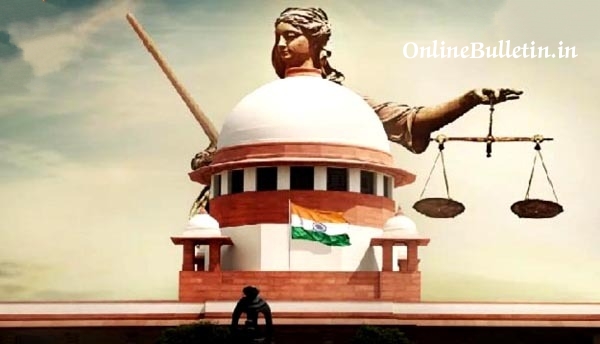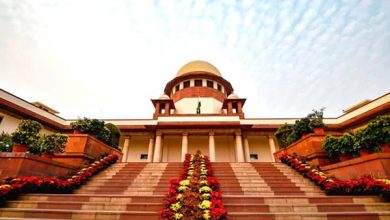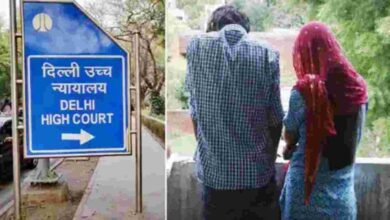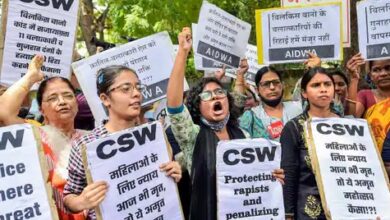हिन्दुओं की जिन राज्यों में संख्या कम है वहां अल्पसंख्यक का दर्जा देने की मांग पर; केंद्र ने कहा- व्यापक परामर्श की जरूरत hinduon kee jin raajyon mein sankhya kam hai vahaan alpasankhyak ka darja dene kee maang par; kendr ne kaha- vyaapak paraamarsh kee jaroorat
केस का शीर्षक: अश्विनी कुमार बनाम भारत संघ, रिट याचिका (सी) संख्या- 836 ऑफ 2020

नई दिल्ली | [कोर्ट बुलेटिन] | भारत के जिन राज्यों में हिन्दुओं की संख्या कम है, वहां उन्हें अल्पसंख्यक का दर्जा देने की मांग करने वाली याचिका पर सोमवार 9 मई 2022 को केंद्र सरकार ने पिछले हलफनामे के स्थान पर एक नया हलफनामा दायर किया है; जिसमें कहा गया है कि राज्यों को अल्पसंख्यक का दर्जा देने का आह्वान करना है। नए हलफनामे में केंद्र का कहना है कि उसके पास अल्पसंख्यकों को सूचित करने की शक्ति है, लेकिन इस संबंध में एक स्टैंड “राज्य सरकारों और अन्य हितधारकों के साथ व्यापक परामर्श” के बाद ही ” भविष्य की अनपेक्षित जटिलताओं” से बचने के लिए लिया जा सकता है।
केंद्रीय मंत्रालय के माध्यम की ओर से दायर हलफनामे में कहा गया है, “उपरोक्त हलफनामा (28 मार्च, 2022) दाखिल करने के बाद केंद्र सरकार ने अल्पसंख्यक मामलों को लेकर एक विस्तृत अंतर-मंत्रालयी चर्चा की, जिसके आधार पर पहले के हलफनामे के स्थान पर वर्तमान हलफनामा दाखिल करने का निर्णय लिया गया।”
मिजोरम, कश्मीर, नागालैंड, मेघालय, अरुणाचल प्रदेश, पंजाब, मणिपुर और केंद्र शासित प्रदेशों लद्दाख और लक्षद्वीप जैसे राज्यों में हिंदू धर्म, बहावाद और यहूदी धर्म को अल्पसंख्यक का दर्जा देने के लिए एडवोकेट अश्विनी उपाध्याय द्वारा दायर जनहित याचिका में जवाबी हलफनामा दायर किया गया है।
जनहित याचिका में राष्ट्रीय अल्पसंख्यक आयोग अधिनियम 1992 और राष्ट्रीय अल्पसंख्यक शैक्षिक संस्थान आयोग अधिनियम 2004 को लागू करने की संसद की क्षमता और अल्पसंख्यकों को अधिसूचित करने की केंद्र सरकार की शक्ति पर भी सवाल उठाया गया है।
मंत्रालय ने 28 मार्च को दायर हलफनामे में कहा था कि जिन राज्यों में वे अल्पसंख्यक हैं, वहां के हिंदुओं को संबंधित राज्य सरकार द्वारा अनुच्छेद 29 और 30 के तहत अल्पसंख्यक के रूप में अधिसूचित किया जा सकता है।
केंद्र ने पिछले हलफनामे में तर्क दिया था कि चूंकि राज्यों के पास अल्पसंख्यकों को अधिसूचित करने की शक्ति है, याचिकाकर्ता का तर्क है कि निर्दिष्ट राज्यों में “असली अल्पसंख्यकों” को अल्पसंख्यक अधिकारों के संरक्षण से वंचित किया जाता है।
हलफनामे में धार्मिक और भाषाई अल्पसंख्यकों को अधिसूचित करने वाले राज्यों के उदाहरण भी दिए गए थे। वर्तमान हलफनामे में कहा गया है, “यह प्रस्तुत किया गया है कि इस रिट याचिका में शामिल प्रश्नों का पूरे देश में दूरगामी प्रभाव पड़ा है और इसलिए, हितधारकों के साथ विस्तृत विचार-विमर्श के बिना कोई भी कदम देश के लिए एक अनपेक्षित जटिलताओं का परिणाम हो सकता है।”
अल्पसंख्यक मामलों के मंत्रालय की सचिव रेणुका कुमार द्वारा शपथ पत्र में आगे कहा गया है: “मैं सम्मानपूर्वक प्रस्तुत करता हूं कि अल्पसंख्यकों को अधिसूचित करने के लिए केंद्र सरकार के पास शक्ति निहित है, याचिकाओं के इस समूह में उठाए गए मुद्दों के संबंध में केंद्र सरकार द्वारा तैयार किए जाने वाले स्टैंड को राज्य सरकारों और अन्य हितधारकों के साथ व्यापक परामर्श के बाद अंतिम रूप दिया जाएगा।
यह सुनिश्चित करेगा कि केंद्र सरकार इस तरह के एक महत्वपूर्ण मुद्दे के संबंध में भविष्य में किसी भी अनपेक्षित जटिलताओं को दूर करने वाले कई सामाजिक और अन्य पहलुओं को ध्यान में रखते हुए इस माननीय न्यायालय के समक्ष एक सुविचारित दृष्टिकोण रखने में सक्षम है।”
न्यायमूर्ति एसके कौल की अध्यक्षता वाली पीठ मामले की सुनवाई कर रही है। पिछली सुनवाई की तारीख में, पीठ ने स्पष्टता मांगी थी कि किस मंत्रालय को जवाब देना चाहिए – चाहे गृह मंत्रालय हो या अल्पसंख्यक मामलों का मंत्रालय।
पीठ ने कहा था कि रजिस्ट्री ने 28 मार्च, 2022 की अपनी कार्यालय रिपोर्ट में गृह मंत्रालय द्वारा दिए गए बयान को दर्ज किया कि अल्पसंख्यकों के लिए राष्ट्रीय आयोग और अल्पसंख्यक शैक्षिक संस्थानों के लिए राष्ट्रीय आयोग के रूप में मामले में भूमिका क्रमशः शिक्षा मंत्रालय (पूर्व में एमएचआरडी) और अल्पसंख्यक मामलों के मंत्रालय के दायरे में आती है। याचिकाकर्ता की ओर एडवोकेट अश्विनी उपाध्याय पेश हुए थे।
On the demand of giving minority status to the states where the number of Hindus is less; Center said- need for comprehensive consultation
Case Title: Ashwini Kumar Vs Union of India, Writ Petition (C) No. 836 of 2020
New Delhi | [Court Bulletin] | On Monday, 9 May 2022, the Central Government has filed a new affidavit in place of the previous affidavit on a petition seeking minority status in the states of India where Hindus are less in number; In which it has been said that there is a call to give minority status to the states. In the fresh affidavit, the Center says it has the power to inform minorities, but a stand in this regard can be taken only after “extensive consultation with state governments and other stakeholders” to avoid “unintended future complications”. could.
The affidavit filed through the Union Ministry said, “After the filing of the above affidavit (March 28, 2022), the Central Government held a detailed inter-ministerial discussion on Minority Affairs, based on which the earlier affidavit was replaced. But it was decided to file the present affidavit.”
Counter affidavit in PIL filed by Advocate Ashwini Upadhyay seeking minority status to Hinduism, Bahaism and Judaism in states like Mizoram, Kashmir, Nagaland, Meghalaya, Arunachal Pradesh, Punjab, Manipur and Union Territories of Ladakh and Lakshadweep has gone.
The PIL has also questioned the Parliament’s ability to implement the National Commission for Minorities Act 1992 and the National Commission for Minorities Educational Institutions Act 2004 and the power of the Central Government to notify minorities.
The ministry, in its affidavit filed on March 28, had said that Hindus from states where they are a minority can be notified as a minority by the respective state government under Articles 29 and 30.
The Center had argued in a previous affidavit that since states have the power to notify minorities, the petitioner argues that “real minorities” in specified states are denied protection of minority rights.
The affidavit also cited examples of states notifying religious and linguistic minorities. The present affidavit said, “It is submitted that the questions included in this writ petition have far-reaching implications for the entire country and therefore, any move without detailed consultation with the stakeholders may lead to unforeseen complications for the country.” There could be consequences.”
The affidavit by Renuka Kumar, Secretary, Ministry of Minority Affairs, further stated: “I respectfully submit that the power vests with the Central Government to notify the minorities, with regard to the issues raised in this set of petitions to the Center. The stand to be prepared by the government will be finalized after extensive consultation with the state governments and other stakeholders.
The affidavit by Renuka Kumar, Secretary, Ministry of Minority Affairs, further stated: “I respectfully submit that the power vests with the Central Government to notify the minorities, with regard to the issues raised in this set of petitions to the Center. The stand to be prepared by the government will be finalized after extensive consultation with the state governments and other stakeholders.
A bench headed by Justice SK Kaul is hearing the matter. In the last hearing date, the bench had sought clarity as to which ministry should respond – be it the home ministry or the minority affairs ministry.
The bench had observed that the Registry, in its office report dated March 28, 2022, recorded the statement made by the Ministry of Home Affairs that the role in the matter as the National Commission for Minorities and the National Commission for Minority Educational Institutions, respectively, by the Ministry of Education (formerly MHRD) and comes under the purview of the Ministry of Minority Affairs. Advocate Ashwini Upadhyay appeared for the petitioner.















